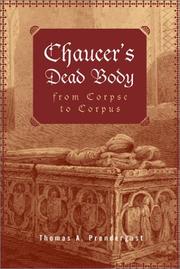| Listing 1 - 6 of 6 |
Sort by
|

ISBN: 1135887268 1135887276 0415966787 1280050845 0203495772 9780203495773 9780415966795 0415966795 9780415966788 9786610050840 6610050848 0415966795 9781135887278 9781135887223 1135887225 9781135887261 0203605225 9781280050848 Year: 2004 Publisher: New York : Routledge,
Abstract | Keywords | Export | Availability | Bookmark
 Loading...
Loading...Choose an application
- Reference Manager
- EndNote
- RefWorks (Direct export to RefWorks)
In Chaucer's Dead Body, Thomas Prendergast looks at the material reasons behind Chaucer's transformation into a touchstone for the whole of the Anglophone Middle Ages.
Literature, Medieval --- Authors and readers --- Criticism --- Middle Ages in literature. --- Canon (Literature) --- Classics, Literary --- Literary canon --- Literary classics --- Best books --- Literature --- Evaluation of literature --- Literary criticism --- Rhetoric --- Aesthetics --- Readers and authors --- Authorship --- History and criticism --- Theory, etc. --- History. --- Technique --- Evaluation --- Chaucer, Geoffrey, --- Chaucer, Jeffrey, --- Chʻiao-sou, Chieh-fu-lei, --- Chieh-fu-lei Chʻiao-sou, --- Choser, Dzheffri, --- Choser, Zheoffreĭ, --- Cosvr, Jvoffrvi, --- Tishūsar, Zhiyūfrī, --- Criticism and interpretation --- Appreciation --- Death and burial. --- Tomb.
Book
ISBN: 9780812291902 Year: 2015 Publisher: Philadelphia
Abstract | Keywords | Export | Availability | Bookmark
 Loading...
Loading...Choose an application
- Reference Manager
- EndNote
- RefWorks (Direct export to RefWorks)
Multi
ISBN: 9780812291902 9780812247503 Year: 2015 Publisher: Philadelphia, Pa University of Pennsylvania Press
Abstract | Keywords | Export | Availability | Bookmark
 Loading...
Loading...Choose an application
- Reference Manager
- EndNote
- RefWorks (Direct export to RefWorks)
Book
ISBN: 1526147998 1526142007 1526126877 9781526126870 9781526142009 1526126869 9781526126863 1526126885 9781526147998 Year: 2018 Publisher: Manchester, UK : Manchester University Press,
Abstract | Keywords | Export | Availability | Bookmark
 Loading...
Loading...Choose an application
- Reference Manager
- EndNote
- RefWorks (Direct export to RefWorks)
This work argues that the temporal privilege of the medieval masks the extent to which the medieval and medievalistic are mutually constitutive and ultimately dependent not on absolutist epistemological claims but on how feelings and temperaments affect the way we approach the Middle Ages.
Medievalism. --- Civilization, Medieval --- Middle Ages --- Mediewalizm. --- Literatura średniowieczna --- Historia średniowieczna --- Średniowiecze --- historia i krytyka --- teoria. --- historiografia. --- w literaturze. --- Historiography --- Medievalists --- Literature, Medieval --- Middle Ages in literature. --- Medieval Literature --- Literary Studies: Classical, Early & Medieval --- LITERARY CRITICISM / Medieval --- Historiography. --- History and criticism --- Theory, etc. --- Affect. --- Death. --- Disciplinary. --- Discontent. --- Future. --- Love. --- Medieval. --- Modernity. --- Nostalgia. --- disciplinarity. --- medieval studies.
Book
ISBN: 1108147992 1108147682 1108148905 1107192846 131664412X Year: 2018 Publisher: Cambridge : Cambridge University Press,
Abstract | Keywords | Export | Availability | Bookmark
 Loading...
Loading...Choose an application
- Reference Manager
- EndNote
- RefWorks (Direct export to RefWorks)
Responding to the lively resurgence of literary formalism, this volume delivers a timely and fresh exploration of the works of Geoffrey Chaucer. Advancing 'new formalist' approaches, medieval scholars have begun to ask what happens when structure fails to yield meaning, probing the very limits of poetic organization. While Chaucer is acknowledged as a master of form, his work also foregrounds troubling questions about formal agency: the disparate forces of narrative and poetic practice, readerly reception, intertextuality, genre, scribal attention, patronage, and historical change. This definitive collection of essays offers diverse perspectives on Chaucer and a varied analysis of these problems, asking what happens when form is resisted by author or reader, when it fails by accident or by design, and how it can be misleading, errant, or even dangerous.
Chaucer, Geoffrey, --- Chaucer, Jeffrey, --- Chʻiao-sou, Chieh-fu-lei, --- Chieh-fu-lei Chʻiao-sou, --- Choser, Dzheffri, --- Choser, Zheoffreĭ, --- Cosvr, Jvoffrvi, --- Tishūsar, Zhiyūfrī, --- Criticism and interpretation. --- Criticism, Textual. --- Technique.
Multi
ISBN: 9781108147682 9781107192843 9781316644126 Year: 2018 Publisher: Cambridge Cambridge University Press
Abstract | Keywords | Export | Availability | Bookmark
 Loading...
Loading...Choose an application
- Reference Manager
- EndNote
- RefWorks (Direct export to RefWorks)
| Listing 1 - 6 of 6 |
Sort by
|

 Search
Search Feedback
Feedback About UniCat
About UniCat  Help
Help News
News